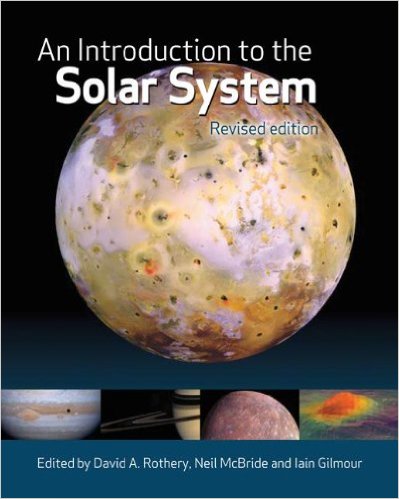ASTR330: Spring 2016
The
Solar System
Course Description:
This course is intended primarily for juniors and seniors who are
not majoring in the physical sciences and who have successfully
completed either ASTR 100 or ASTR 101. The course will
emphasize the way in which we combine different types of information
to answer fundamental questions about the Solar System, such as
- How did the Solar System form?
- How have the planets evolved subsequent to formation?
- Are there planetary systems like our own orbiting other stars?
Accordingly, we will consider the important physical and
chemical processes in the Solar System and illustrate them with
examples from the real planets, moons, and small bodies, rather than
exploring these objects one by one.
We will consider how our ideas have changed over the centuries, as
well as the most modern data. What was Galileo's view of the Solar
System? How has our view changed and how has the spacecraft named for
Galileo helped to change this view? What are all the new Kuiper Belt
(or Trans-Neptunian) Objects that we have discovered in the outer
Solar System over the last several years and what relation do they
have to the objects we have known about for centuries? Why do we need
to send spacecraft out into the Solar System System?
We will use a little mathematics in this course and a lot
of physical reasoning, and we will use information from geology, meteorology,
and physics as well as from astronomy, all sciences that have contributed
importantly to planetary science. Your challenge will be to master this
diverse and extensive body of knowledge.
Course Expectations:
Attendance: In order to succeed in this course, I
expect you to attend all lectures. This is very important! The
material on the homeworks and exams are based upon the material
covered in the lectures and in the text. If you have to miss a
lecture be sure to look at another student's notes and make sure that
you understand what was covered. There will be times during the
semester when I will ask for written responses to questions. Your
written answers will count towards your grade in the class.
Preparation: I expect you to be prepared to work.
You will understand the lecture more easily if you preview the reading
assignment. A more careful reading is recommended after lecture. It
is also good to study your class notes sometime before the next
lecture to make sure that everything is clear. I encourage you to ask
questions in class, during office hours, or over email.
Study Habits: Study wisely and ask for help if you
need it. If you just cram the night before the exam, you probably
will not do very well. It is better (and easier) if you keep up with
the material on a daily basis. Make it a point to read the chapters in
pace with the lectures; this is one of the best study habits you can
have. If you have questions, please see me.
Grading:
I grade on a point scale with different assignments weighted as shown
in the table.
| ASSIGNMENT |
Homework |
Exam I |
Exam II |
Participation |
Final |
Total |
| POINTS |
200 |
100 |
100 |
100 |
200 |
700 |
Letter grades will be assigned based upon your curved cumulative
score. Here is how your grade will be determined from your point
total in the class.
| Letter Grade |
Course Total | Percentage |
| A |
630-700 | 90%-100% |
| B |
560-629 | 80%-89% |
| C |
476-559 | 68%-79% |
| D |
385-475 | 55%-67% |
| F |
0-384 | 0%-54% |
The point scale makes it possible for everyone in the class to do
well. For example, if everyone scores above 80% in the course, you
would all receive either a B- or better letter grade. I do use +/-
modifiers - you will get a "+" if you are in roughly the upper 1/3 of
students with the same letter grade and a "-" if you are in the lower
1/3. I may adjust the number of points required to get a given grade
depending on the class averages; however, any adjustment will make it
easier to get a given grade, never more difficult. You can monitor my
current estimate of your grade from the class webpage as the semester
progresses.
Exams
There will be two in-class exams. These exams are closed book with
no notes and no calculators allowed. Each exam will consist of short
answer questions and three or four essay questions. These exams are
incremental (i.e., non-cumulative) checkups on how well you have
learned the material. The schedule of lectures included in this
syllabus shows what material will be covered on each exam. If for
whatever reason, the University is officially closed on the
exam date, the exam date shifts to the next lecture date.
According to University rules, the final exam for this course
will be held on Tuesday, May 17 from 1:30pm to 3:30pm in CSS
2428. This final exam is cumulative, that is, it will cover
all material discussed in this course. However, since
chapters 7-9 will not be covered by the midterm exams (see Lecture
Schedule), the weight on these chapters will be higher than on
earlier chapters. The final will include short answer, essay, and
problem solving questions with the exact combination to be determined.
This exam is also closed book with no notes and no calculators
allowed.
Missed Exams
If you are not able to take an exam due to illness or other legitimate
reasons (as outlined in the Academic Info section of the schedule of
classes) and you wish to take a make-up exam, you must
1) contact me by email before you miss the
regularly-scheduled exam and
2) submit a valid written excuse for
your absence within one week after the
regularly-scheduled exam.
Homeworks
There are a total of four homeworks in this course. All homeworks
will be handed out in class and will also be made available from
the
Assignments link from the class website. Turn in your homework
assignment online on the Assignments website by the beginning of class
on the due date. Late homeworks will be assessed a late penalty; to
avoid this you can turn your homework in up to a week early. Please
type up your assignments and convert them to PDF format before turning
them in.
Although you may discuss the homework problems with your friends,
the final writeup must be in your own words. Copying from a
friend's homework, copying from a book, or allowing a friend to copy
your homework is academic dishonesty and will not be tolerated in this
class. If you consult a reference other than the course text, please
acknowledge it in your homework - this includes websites!
Participation
One hundred points will be based on your in class participation. Many
things will count toward this score including interactive and
individual work done in class, attendance as measured by bonus point
questions, occasional mini in-class quizzes based on the book
chapters, thoughtful blog posts, and attentiveness and interactivity
during class. The best was to succeed in any class is to attend and
pay attention to lecture, to read the book, and to think critically
about the course material. Participation points are designed to
encourage these activities. Excessive use of phones, the internet, and
laptop computers in class have been demonstrated to lead to poorer academic
performance - these activities will count against your
participation score.
Extra Credit
There will be no extra credit papers or projects. The following are the
only ways to earn extra credit in this class:
- Attend Class: I will often ask questions worth bonus points
during lectures.
- Post to the class Blog in first month of the class.
Academic Integrity
The University of Maryland, College Park has a
nationally recognized Code of Academic Integrity, administered by the
Student Honor Council. This Code sets standards for academic
integrity at Maryland for all undergraduate and graduate students. As
a student you are responsible for upholding these standards for this
course. It is very important for you to be aware of the definitions
and consequences of cheating, fabrication, facilitation, and
plagiarism. For more information on the Code of Academic Integrity or
the Student Honor Council, please visit
http://www.shc.umd.edu/SHC/Default.aspx; pay particular attention
to the links for students. We are very serious
about this.
 Back to
the ASTR330 Homepage
Back to
the ASTR330 Homepage


 Back to
the ASTR330 Homepage
Back to
the ASTR330 Homepage